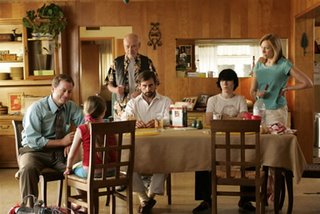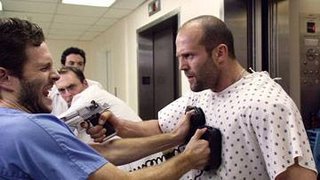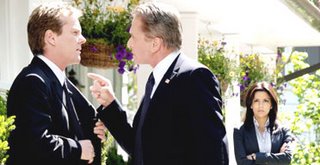 When Jean-Luc Godard resolved that his next movie would be about “a girl and a gun”, he was cracking wise about the conventions of gangster movies and at the same time coming to terms with the fact that in order to sell tickets, the filmmaker must give the public what it wants. So it proves in Oliver Stone’s World Trade Centre, which takes the true story of two policemen who were pulled from the rubble of the collapsed towers to fashion a mausoleum of faithful Christian heroes, substituting gat-toting molls for atheists and foxholes. From the bones of a story that everybody knows, we are presented with a flag-waving, overly sentimental film designed to help American audiences exorcise the ghosts of 9/11 without ever confronting the reasons why the catastrophe happened or how it brought about the War in Iraq.
When Jean-Luc Godard resolved that his next movie would be about “a girl and a gun”, he was cracking wise about the conventions of gangster movies and at the same time coming to terms with the fact that in order to sell tickets, the filmmaker must give the public what it wants. So it proves in Oliver Stone’s World Trade Centre, which takes the true story of two policemen who were pulled from the rubble of the collapsed towers to fashion a mausoleum of faithful Christian heroes, substituting gat-toting molls for atheists and foxholes. From the bones of a story that everybody knows, we are presented with a flag-waving, overly sentimental film designed to help American audiences exorcise the ghosts of 9/11 without ever confronting the reasons why the catastrophe happened or how it brought about the War in Iraq. The Weight of History
 When Jean-Luc Godard resolved that his next movie would be about “a girl and a gun”, he was cracking wise about the conventions of gangster movies and at the same time coming to terms with the fact that in order to sell tickets, the filmmaker must give the public what it wants. So it proves in Oliver Stone’s World Trade Centre, which takes the true story of two policemen who were pulled from the rubble of the collapsed towers to fashion a mausoleum of faithful Christian heroes, substituting gat-toting molls for atheists and foxholes. From the bones of a story that everybody knows, we are presented with a flag-waving, overly sentimental film designed to help American audiences exorcise the ghosts of 9/11 without ever confronting the reasons why the catastrophe happened or how it brought about the War in Iraq.
When Jean-Luc Godard resolved that his next movie would be about “a girl and a gun”, he was cracking wise about the conventions of gangster movies and at the same time coming to terms with the fact that in order to sell tickets, the filmmaker must give the public what it wants. So it proves in Oliver Stone’s World Trade Centre, which takes the true story of two policemen who were pulled from the rubble of the collapsed towers to fashion a mausoleum of faithful Christian heroes, substituting gat-toting molls for atheists and foxholes. From the bones of a story that everybody knows, we are presented with a flag-waving, overly sentimental film designed to help American audiences exorcise the ghosts of 9/11 without ever confronting the reasons why the catastrophe happened or how it brought about the War in Iraq. Apocalypse Soon
 The world, the one you’re standing on right now, is heating up faster than a teenager’s face at a school disco, a process that means serious trouble for mankind. Now that is inconvenient.
The world, the one you’re standing on right now, is heating up faster than a teenager’s face at a school disco, a process that means serious trouble for mankind. Now that is inconvenient.Global warming is real, not the ramblings of tree-huggers. And it isn't a natural, cyclical phenomenon, we caused it to happen. A short twenty years from now, according to Al Gore in his brilliantly argued but terrifying documentary, An Inconvenient Truth, it’ll be too late to reverse its disastrous effects, meaning life for our children and grandchildren will be an distinctly uncomfortable prospect.
Director Davis Guggenheim’s documentary is, for the most part, a simple recording of the powerpoint presentation and lecture that Gore has toured the world with (on carbon-spewing aeroplanes, worryingly) for the past five or six years, enlivened by the addition of some robustly presentled statistics of doom, a few chucklesome, self-effacing jokes and long segues into biographical background details on the former US Vice President. If that sounds boring, the film is anything but – it’s as gripping as any horror movie with the difference being that this is real, and its denouement is imminent.
Practical information and more details on the film are available at the film's special website.
A Ray of Hope
 Little Miss Sunshine, the Sundance-winning feature debut from husband and wife directing team Jonathan Dayton and Valerie Faris, takes a stock film genre, the dysfunctional family road-trip, and with the help of a razor-sharp script from fellow newcomer Michael Arndt, breathes into it new, albeit warped and sardonic, life.
Little Miss Sunshine, the Sundance-winning feature debut from husband and wife directing team Jonathan Dayton and Valerie Faris, takes a stock film genre, the dysfunctional family road-trip, and with the help of a razor-sharp script from fellow newcomer Michael Arndt, breathes into it new, albeit warped and sardonic, life. The American everyman Greg Kinnear and the brilliant Toni Collette are Richard and Sheryl Hoover, a married couple barely holding everything together in the flat-pack suburbs of Albuquerque. She’s tired of trying, feeding the family take-out chicken on paper plates while he’s a failed motivational speaker. They have two children; teenager Dwayne (Paul Dano), who is devoted to Nietzsche and has taken a vow of silence until he is allowed to join the air force and the younger Olive (Abigail Breslin), a chubby seven year old who harbours dreams of becoming a beauty queen. Their grandpa (the extraordinary Alan Arkin) is helping her achieve this dream, in between hits from his heroin stash. When Sheryl’s brother Frank (Steve Carell), a literature professor, fails in a suicide attempt and has nowhere left to go, she takes him in, completing the dysfunctional clan. All they need now is something to do; which, when another kid drops out, takes the shape of a cross-country road trip to take little Olive to the titular Little Miss Sunshine pageant in California. With little money, they pile into the family van and hit the road.
Crank Shaft
 Crank, I am assured, is American street slang for methamphetamine, making it the perfect title, never mind prerequisite, for this blistering action movie which takes us through the last day on earth of an ex-pat British hit-man. Jason Statham, who has made a career out of these tough-guy chase movies following The Transporter, plays British hit-man Chev Chelios, who wakes up on the day in question with a bit of a problem. Local Chicano gangster Ricky Verona has taken umbrage with Chev eliminating a Chinese drug runner, and has administered a dose of ‘Beijing’ poison while he slept. According to the DVD message Verona leaves behind, Chev only has hours to live and there is no antidote. Already struggling, our anti-hero makes a run for it, believing there must be some way to stay alive or at least exact an excruciating revenge on his tormentors. His medical pal Dr Miles (a deliciously sleazy Dwight Yoakam) is stuck on an airplane, but tells him that the only way to keep breathing is to maintain the adrenaline level in his body until he can attend to him. Cue deliberately dangerous manoeuvres on Chev’s part as he screeches around LA, with the requirement to stay buzzed matched by the desire to avenge his own death. Meanwhile, the army of gangsters are furiously trying to finish the job, Chev’s pot-smoking surf-girl girlfriend Eve (Amy Smart) is along for her own safety and the cannon-fodder cops are closing the dragnet, following the eye of the hurricane.
Crank, I am assured, is American street slang for methamphetamine, making it the perfect title, never mind prerequisite, for this blistering action movie which takes us through the last day on earth of an ex-pat British hit-man. Jason Statham, who has made a career out of these tough-guy chase movies following The Transporter, plays British hit-man Chev Chelios, who wakes up on the day in question with a bit of a problem. Local Chicano gangster Ricky Verona has taken umbrage with Chev eliminating a Chinese drug runner, and has administered a dose of ‘Beijing’ poison while he slept. According to the DVD message Verona leaves behind, Chev only has hours to live and there is no antidote. Already struggling, our anti-hero makes a run for it, believing there must be some way to stay alive or at least exact an excruciating revenge on his tormentors. His medical pal Dr Miles (a deliciously sleazy Dwight Yoakam) is stuck on an airplane, but tells him that the only way to keep breathing is to maintain the adrenaline level in his body until he can attend to him. Cue deliberately dangerous manoeuvres on Chev’s part as he screeches around LA, with the requirement to stay buzzed matched by the desire to avenge his own death. Meanwhile, the army of gangsters are furiously trying to finish the job, Chev’s pot-smoking surf-girl girlfriend Eve (Amy Smart) is along for her own safety and the cannon-fodder cops are closing the dragnet, following the eye of the hurricane. Sentry Duty
 Michael Douglas leads the line in The Sentinel; a dull, formulaic political thriller that gives the surgically-elevated grandfather another opportunity to race around in a dark suit, shouting important-sounding things into his cuffs and shooting off guns. He plays Secret Service agent Pete Garrison, who in 1981 took a bullet during the assassination attempt on Ronald Reagan and is still guarding current President Ballentine (David Rasche) 25 years later. Garrision’s duties also include tending to the First Lady Sarah (Kim Basinger), with whom he is having an unlikely but passionate affair, under the noses of the crack security team and the world’s press.
Michael Douglas leads the line in The Sentinel; a dull, formulaic political thriller that gives the surgically-elevated grandfather another opportunity to race around in a dark suit, shouting important-sounding things into his cuffs and shooting off guns. He plays Secret Service agent Pete Garrison, who in 1981 took a bullet during the assassination attempt on Ronald Reagan and is still guarding current President Ballentine (David Rasche) 25 years later. Garrision’s duties also include tending to the First Lady Sarah (Kim Basinger), with whom he is having an unlikely but passionate affair, under the noses of the crack security team and the world’s press. 






